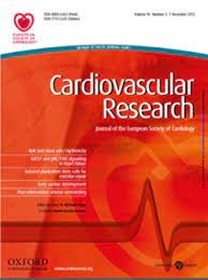Effect of trimetazidine dihydrochloride therapy on myocardial external efficiency in preclinical individuals with a hypertrophic cardiomyopathy pathogenic variant: results of the ENERGY trial
IF 13.3
1区 医学
Q1 CARDIAC & CARDIOVASCULAR SYSTEMS
引用次数: 0
Abstract
Aims Previous studies have shown that individuals with a hypertrophic cardiomyopathy (HCM) pathogenic variant (PV) or likely pathogenic variant (LPV) without a HCM phenotype (PV/LPV carrier) have decreased myocardial external efficiency (MEE), which is thought to be a key pathomechanism in the onset and progression of HCM. Metabolic treatments improved exercise capacity in HCM patients, but evidence that such drugs correct reduced MEE is lacking. The ENERGY trial is a double-blind, placebo-controlled randomized clinical trial to define if the metabolic drug trimetazidine (TMZ) corrects reduced MEE in PV/LPV carriers for HCM. Methods and results 51 MYBPC3 or MYH7 PV/LPV carriers were screened after which 40 were included and randomized into a treatment group (n=20) or placebo group (n=20) stratified for sex. Participants were treated with TMZ 20mg or placebo three times daily during eight weeks. The main outcome of this study was MEE as measured by [11C]-acetate positron emission tomography/computed tomography (PET/CT) and cardiac magnetic resonance (CMR) scan. Secondary outcomes were exercise parameters as measured by cardio-pulmonary exercise testing (CPET). Drug safety was monitored by (serious) adverse event registration. Treatment groups were comparable in terms of age, sex, body mass index, P/LP gene variant, and echocardiographic parameters without significant differences. Baseline CMR parameters and MEE were not significantly different between treatment groups. Eight weeks of treatment with TMZ did not significantly alter MEE compared to placebo. The mean MEE changed from 30.3±3.8 to 29.8±4.3 percent in the placebo group and from 30.1±4 to 29.1±4 percent in the TMZ group. Compared to placebo, the TMZ group did not have a significantly different MEE (difference -0.44, 95% interaction CI, -2.863 to 1.986, P=0.68). The mean V’O2max as a percentage of predicted V’O2max (V’O2max %pred) changed from 108±17 to 111±19 (95% CI, -6 to 10, P=0.84) percent in the placebo group and from 105±17 to 113±14 (95% CI, 1 to 16, P=0.03) percent in the TMZ group. After adjustment for baseline, the TMZ group had a significantly increased V’O2max %pred (difference 6.37, 95% interaction CI, -3 to 16, P=0.04). Conclusion The ENERGY trial is the first proof-of-concept randomized controlled trial to test the hypothesis that TMZ improves MEE in MYBPC3 or MYH7 PV/LPV carriers. We conclude that metabolic therapy with TMZ may not correct the P/LP gene variant-related decrease in MEE. Trial registration Netherlands Trial Register NL7492 (URL https://onderzoekmetmensen.nl/nl/trial/25078)盐酸曲美他嗪治疗对肥厚性心肌病致病变异临床前个体心肌外部效率的影响:ENERGY试验的结果
先前的研究表明,肥厚性心肌病(HCM)致病变异(PV)或无HCM表型的可能致病变异(LPV)个体(PV/LPV携带者)心肌外部效率(MEE)降低,这被认为是HCM发病和进展的关键病理机制。代谢治疗可提高HCM患者的运动能力,但缺乏此类药物纠正MEE降低的证据。ENERGY试验是一项双盲、安慰剂对照的随机临床试验,旨在确定代谢性药物曲美他嗪(TMZ)是否能纠正PV/LPV携带者因HCM而减少的MEE。方法和结果筛选了51例MYBPC3或MYH7 PV/LPV携带者,其中40例按性别随机分为治疗组(n=20)和安慰剂组(n=20)。在八周的时间里,参与者每天服用三次TMZ 20mg或安慰剂。本研究的主要结果是MEE,通过[11C]-醋酸正电子发射断层扫描/计算机断层扫描(PET/CT)和心脏磁共振(CMR)扫描测量。次要结果是通过心肺运动试验(CPET)测量的运动参数。通过(严重)不良事件登记来监测药物安全性。治疗组在年龄、性别、体重指数、P/LP基因变异和超声心动图参数方面具有可比性,无显著差异。基线CMR参数和MEE在治疗组间无显著差异。与安慰剂相比,8周的TMZ治疗没有显著改变MEE。安慰剂组的平均MEE从30.3±3.8%变为29.8±4.3%,TMZ组从30.1±4%变为29.1±4%。与安慰剂组相比,TMZ组MEE无显著差异(差异-0.44,95%相互作用CI, -2.863 ~ 1.986, P=0.68)。平均V 'O2max占预测V 'O2max的百分比(V 'O2max %pred)在安慰剂组从108±17变化到111±19 (95% CI, -6至10,P=0.84) %,在TMZ组从105±17变化到113±14 (95% CI, 1至16,P=0.03) %。经基线调整后,TMZ组V 'O2max %pred显著增加(差异6.37,95%相互作用CI, -3 ~ 16, P=0.04)。ENERGY试验是验证TMZ改善MYBPC3或MYH7 PV/LPV携带者MEE假设的首个概念验证随机对照试验。我们得出结论,用TMZ进行代谢治疗可能无法纠正与P/LP基因变异相关的MEE减少。试验注册荷兰试验注册NL7492(网址https://onderzoekmetmensen.nl/nl/trial/25078)
本文章由计算机程序翻译,如有差异,请以英文原文为准。
求助全文
约1分钟内获得全文
求助全文
来源期刊

Cardiovascular Research
医学-心血管系统
CiteScore
21.50
自引率
3.70%
发文量
547
审稿时长
1 months
期刊介绍:
Cardiovascular Research
Journal Overview:
International journal of the European Society of Cardiology
Focuses on basic and translational research in cardiology and cardiovascular biology
Aims to enhance insight into cardiovascular disease mechanisms and innovation prospects
Submission Criteria:
Welcomes papers covering molecular, sub-cellular, cellular, organ, and organism levels
Accepts clinical proof-of-concept and translational studies
Manuscripts expected to provide significant contribution to cardiovascular biology and diseases
 求助内容:
求助内容: 应助结果提醒方式:
应助结果提醒方式:


